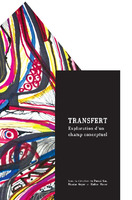Transfert
Exploration d'un champ conceptuel
Author(s)
Gin, Pascal
Goyer, Nicolas
Moser, Walter
Language
FrenchAbstract
The book has three axes of reflection on the concept of transference. In the first part of the volume, Hans-Jürgen Lüsebrink evokes contemporary changes that increase intercultural communications. Walter Moser examines the history of concepts and explores the possibility of "cultural transfer" an instrument that would account for the great cultural mobility that we see today worldwide. Pierre Lévy gives this conceptual exploration highest amplitude by moving it to the general area of information transfer. The second part, "The transfer and knowledge", occupies the bulk of the work. Daniel Simeoni explores translation studies documenting the parallelism of translation and transfer concepts. In psychoanalysis, both as a site that as a practice, the transfer has a long conceptual history; Ellen Corin yet open dialogue with other disciplines and knowledge and raises the possibility of laterally moving the achievements of his thinking to the field of anthropology. In criminal law, Alvaro Pires explores theoretical and methodological issues of transfer, supporting his words with examples. Nicolas Goyer distinguishes between "family transfer" and "migration transfer" to illustrate the need to challenge the priority that has long given the intergenerational transfer.
The third part explores the overlapping of transfers and the media. Timothy Murray explores the 'new media art', where the political intersect, the médiaticotechnologique, psychoanalytic and intercultural. Wolfgang Ernst questioned the "transfer" the confluence of ethnology, ethnography, museology, history and cultural analysis, compared to the theory and history of the media. L’ouvrage propose trois axes de réflexion sur le concept de transfert. Dans la première partie du volume, Hans-Jürgen Lüsebrink évoque les changements contemporains qui augmentent les communications interculturelles. Walter Moser examine l’histoire des concepts et explore la possibilité de faire du « transfert culturel » un instrument qui permettrait de rendre compte de la grande mobilité culturelle que nous observons de nos jours à l’échelle mondiale. Pierre Lévy donne à cette exploration conceptuelle la plus grande amplitude en la déplaçant vers le domaine général du transfert des informations. La deuxième partie, « Le transfert et les savoirs », occupe le gros de l’ouvrage. Daniel Simeoni y explore la traductologie en documentant le parallélisme des concepts de traduction et de transfert. Dans la psychanalyse, tant comme site du savoir que comme pratique, le transfert a une longue histoire conceptuelle; Ellen Corin ouvre pourtant le dialogue à d’autres savoirs et disciplines et évoque la possibilité de déplacer latéralement les acquis de sa réflexion vers le domaine de l’anthropologie. En matière de droit criminel, Alvaro Pires explore des questions théoriques et méthodologiques du transfert, étayant ses propos d’exemples. Nicolas Goyer fait la distinction entre le « transfert généalogique » et le « transfert migratoire » pour illustrer la nécessité de contester la priorité qu’on a longtemps accordée au transfert intergénérationnel.
La troisième partie explore l’imbrication des transferts et des médias. Timothy Murray explore le new media art, où se croisent le politique, le médiaticotechnologique, le psychanalytique et l’interculturel. Wolfgang Ernst s’interroge sur le « transfert » au confluent de l’ethnologie, l’ethnographie, la muséologie, l’histoire et l’analyse des cultures, en regard de la théorie et de l’histoire des médias.
Keywords
intercultural communication; new media art; translation studiesDOI
10.26530/OAPEN_515359ISBN
9782760321625Publisher website
https://press.uottawa.ca/Publication date and place
2014Series
Transferts culturels,Classification
Sociology
Social and cultural anthropology


 Download
Download